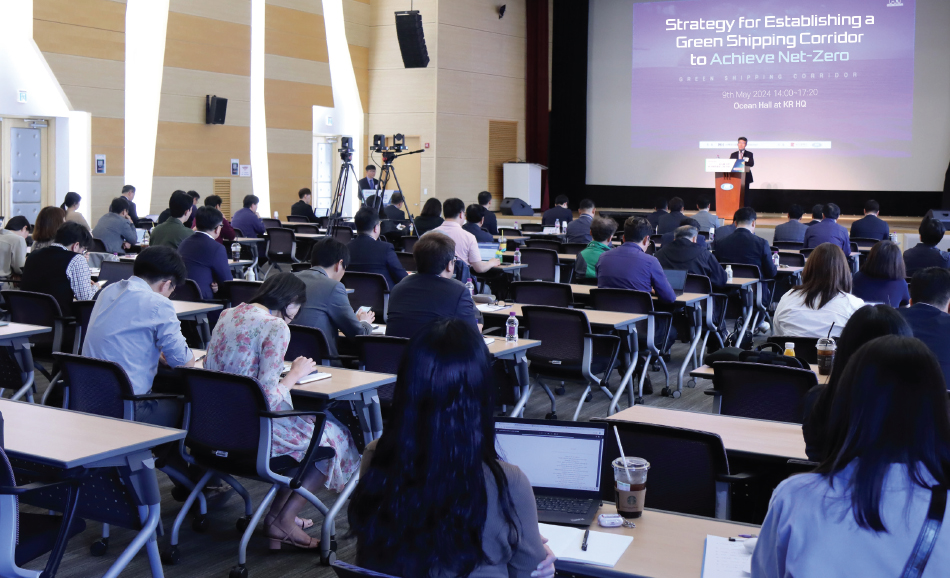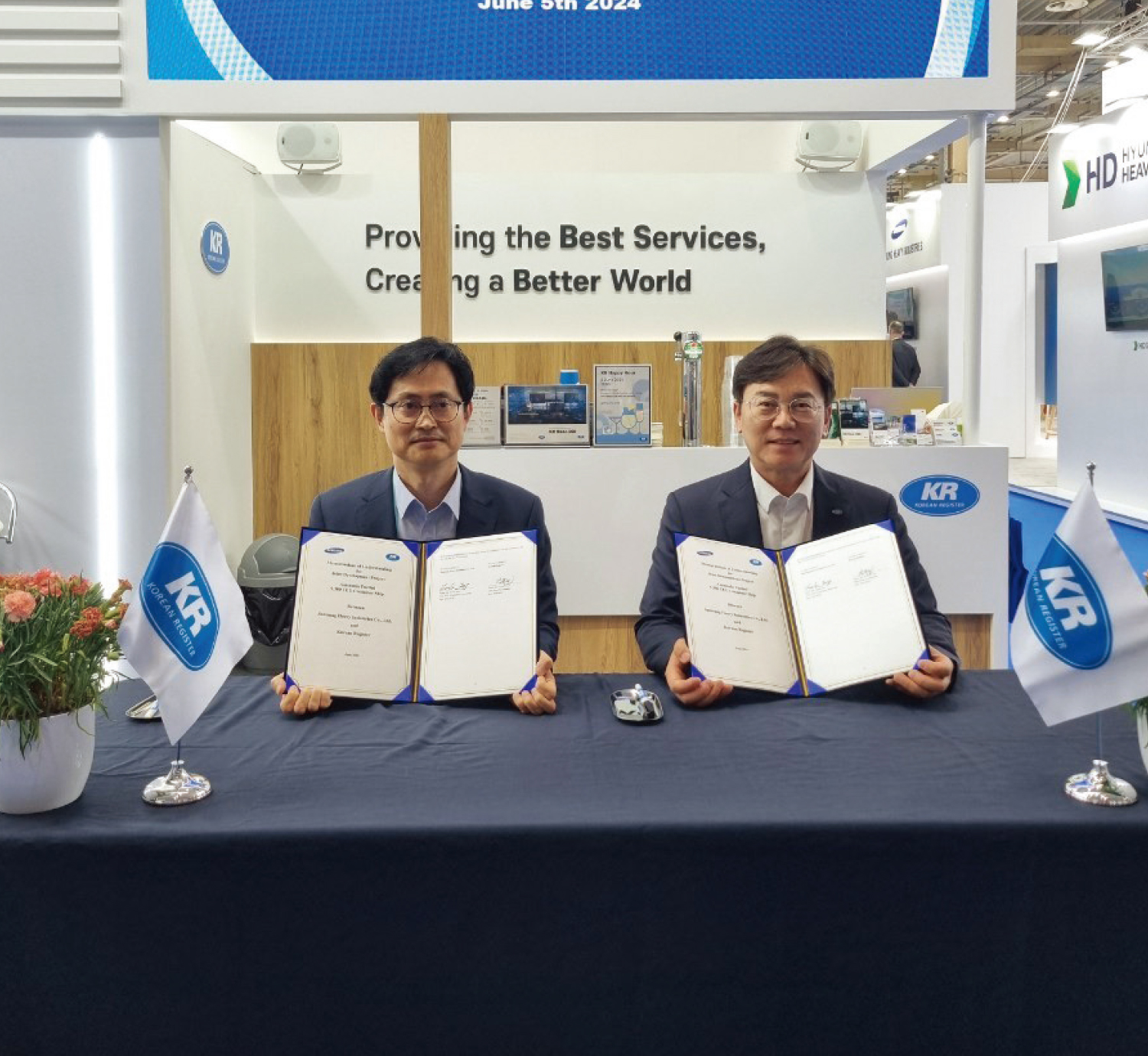Inside KR
KR Decarbonization Magazine
VOL.07 | Summer 2024
KR has awarded AIP for
Hanwha Aerospace's Onboard
Hydrogen Fuel Cell

On May 30th, KR has awarded AIP (Approval In Principle) for Hanwha Aerospace's Onboard hydrogen fuel cell.
The award ceremony, held at Hanwha Aerospace's R&D center, was attended by KIM Daeheon, Executive Vice President of KR's R&D Division, and Moon Seunghak, Head of E-Propulsion System Business Group at Hanwha Aerospace, among others.
The AIP is a certification process that verifies the safety and compliance with inter- national regulations of new technologies applied to ships and equipment, starting from the basic design phase. With this AIP certification, Hanwha Aerospace has officially been recognized for the stability of hydrogen fuel cells.
With this AIP certification, Hanwha Aerospace has not only been officially recognized for the stability of hydrogen fuel cells but has also built the foundation for type approval of onboard hydrogen fuel cells based on polymer electrolyte membrane fuel cells (PEMFC) for future use.
KR Grants Approval to HD HHI’s Next Generation
K-AmmoniaStorage & Powered PCTC

KR has awarded an Approval in Principle (AIP) for the Next Generation K-Ammonia Storage & Powered PCTC, developed by HDHyundai Heavy Industries (HD HHI) withthe participation of Hyundai Glovis and G-Marine Service, at Posidonia 2024.
Currently, to address the increasinglystrin-gent global greenhouse gas regulations, the development of alternativefuel technologies is actively underway, and ammonia fuel technology is one ofthe most highly regarded in the market. However, ammonia is more toxic andcorrosive compared to other alternative fuels, requiring additional safetyverifications considering the fuel propulsion system design and ship operationcharacteristics.
international regulations. Hyundai Glovis and G-MarineService jointly participated in the risk assessment process, enhancing thetechnical com-pleteness.
JEON Seungho, Senior Executive Vice Presidentof HD HHI, stated, “The Next Generation K-ammonia Storage & Powered PCTC developed this time applies HD HHI’s market-leading eco-friendly technology. We will continue to pursue technological development to achieve carbon neutrality as a leading company in the maritime industry.”

YEON Kyujin, Senior Vice President of KR, said, “This AIP has laid an important foundation for the commercialization of ammonia-fueled car carrier ship technology. Based on this, KR will work to support not only ammonia fuel propulsion technologies but also decarbonization technologies for our customers.”
KR Grants AIP for 150K
Ultra-Large Ammonia Carrier
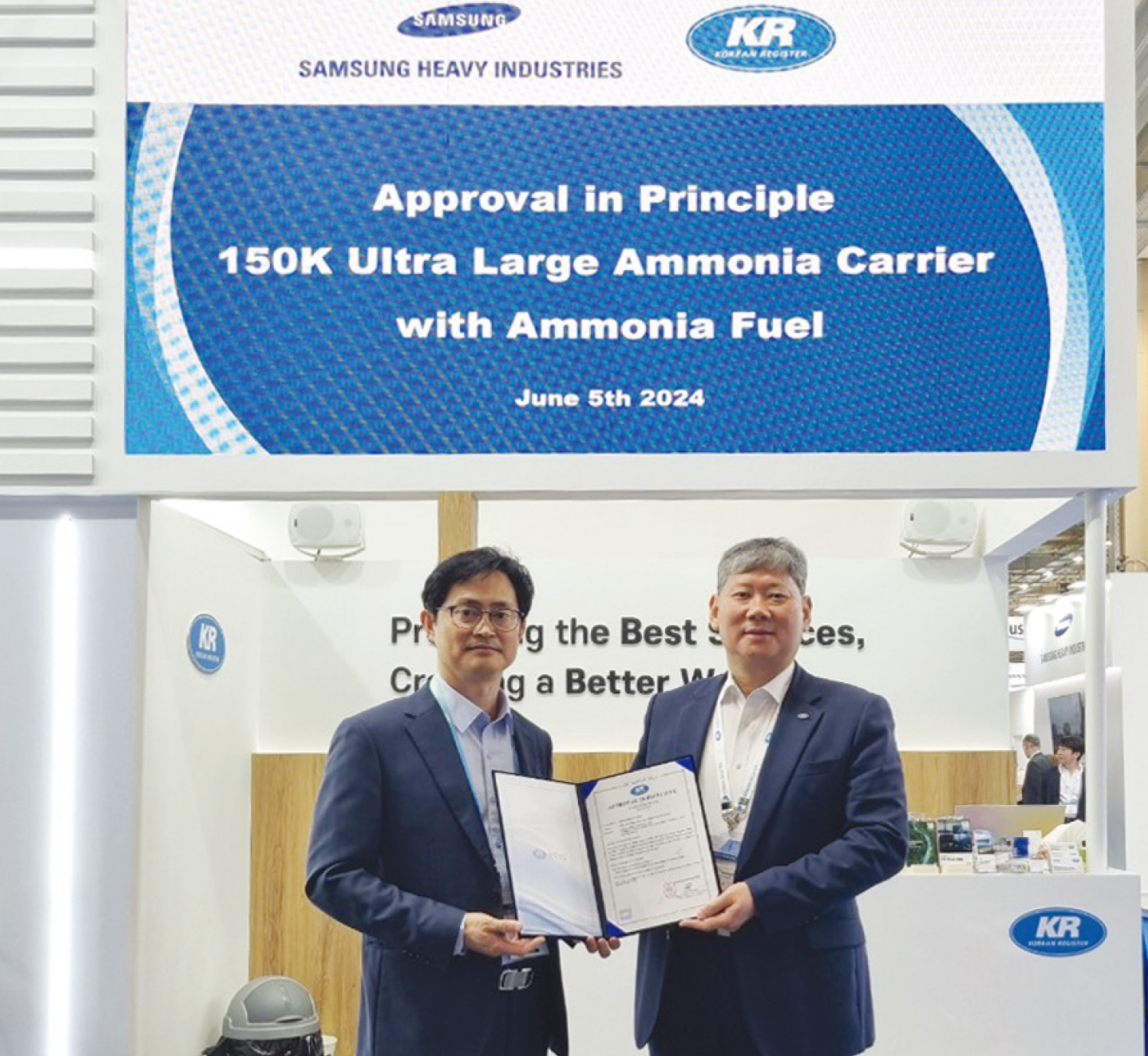
KR announced that it has granted an Approval in Principle (AIP) for the 150K ultra-large ammonia carrier developed by Samsung Heavy Industries (SHI) on June 5th at Posidonia 2024.
The 150K ultra large ammonia carrier was developed as part of a joint development project between KR and SHI. It is designed to transportlarge quantities of ammonia while using ammonia as a propulsion fuel, ensuring zero carbon emissions during operation.
SHI performed the conceptual design of the fuel system, addressing the characte-ristics of ammonia, including fuel supply, ventilation, and gas monitoring systems, and ensured that the basic design of the large tanks met the regulatory requirements.
KR verified the safety of the ammonia fuel system, checked the suitability of the tank arrangement, and reviewed domestic and international regulations to confirm the design compliance of the ultra-large ammonia carrier.
JANG Haeki, Executive Vice President of SHI, stated, “Clean ammonia is expected to play a significant role as an eco-friendly energysource and in energy transport for the future hydrogen society. We anticipate high market demand for ultra-large ammonia carriers to accommodate the expected increase in cargo volumes. The AIP will enable the rapid commercialization of ultra-large ammonia carriers, and based on this, we will collaborate with KR to lead the next-generation ship market by developing 9,300 TEU container carriers.”
KR and SHI Sign MoU for Development
of Ammonia-Fueled Container Ships
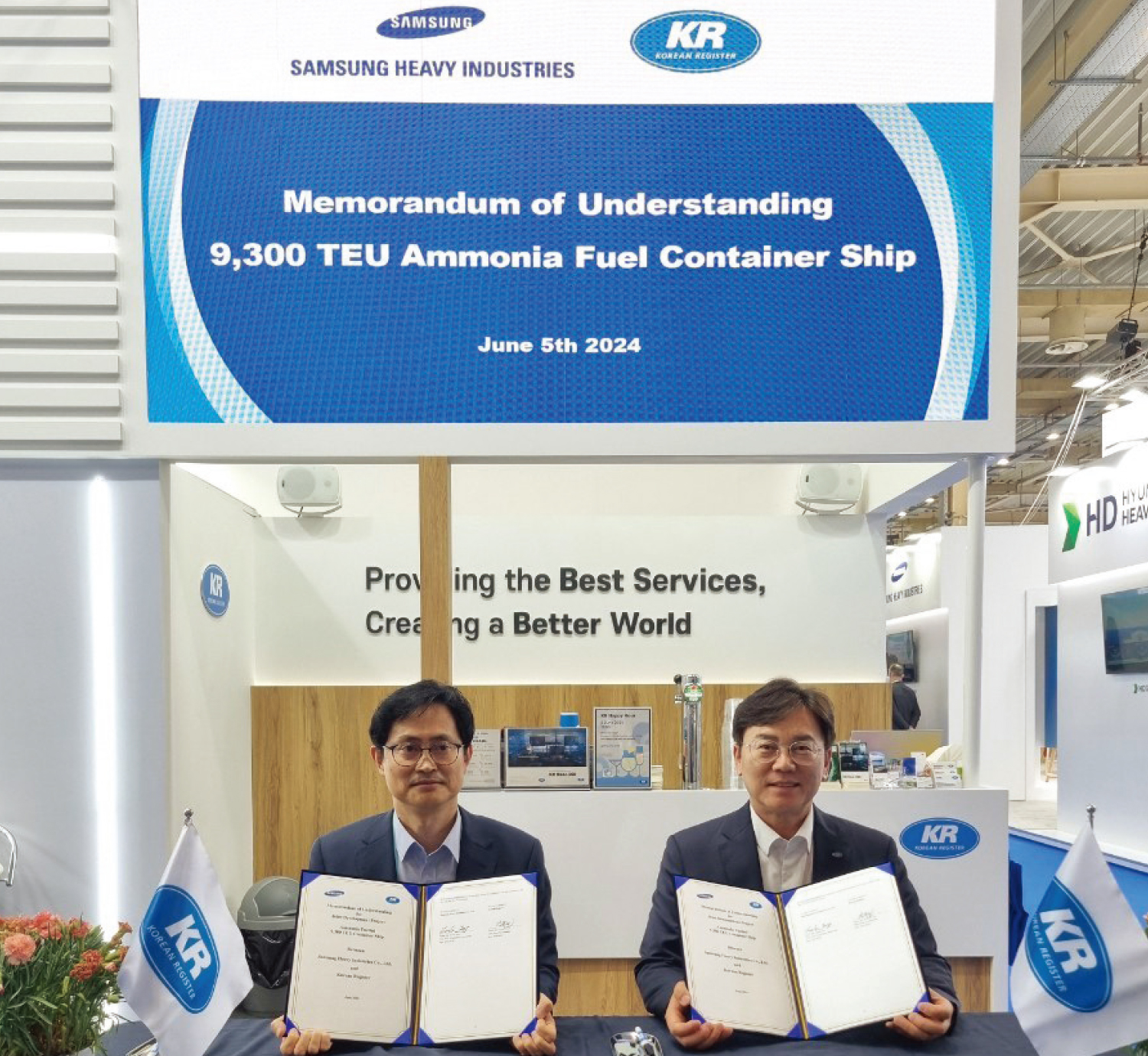
KRsigned a Memorandum of Understanding (MoU) with them for the development of 9,300 TEU ammonia-fueled container ships on June 5th at Posidonia 2024.
SHI will design the main system layout for applying ammonia fuel to neo-panamax 9,300 TEU container ships, and KR will verify the design compliance through the review of classification rules as well as domestic and international regulations, ultimately granting an AIP.
YEON Kyujin, Senior Vice President of KR, stated, “The collaborative projects with SHI focusing on ammonia-fueled ships are pivotal in establishing a solid groundwork for the commercialization of ammonia fuel ship technology. KR remains committed to furthering the advancement of ammonia fuel propulsion technology and supporting decarbonization initiatives.”
KR, Hanwha Ocean, Amogy and Hanwha Aerospace
team up for application of
ammonia reformers and
ammonia fuel cellsystems to ships
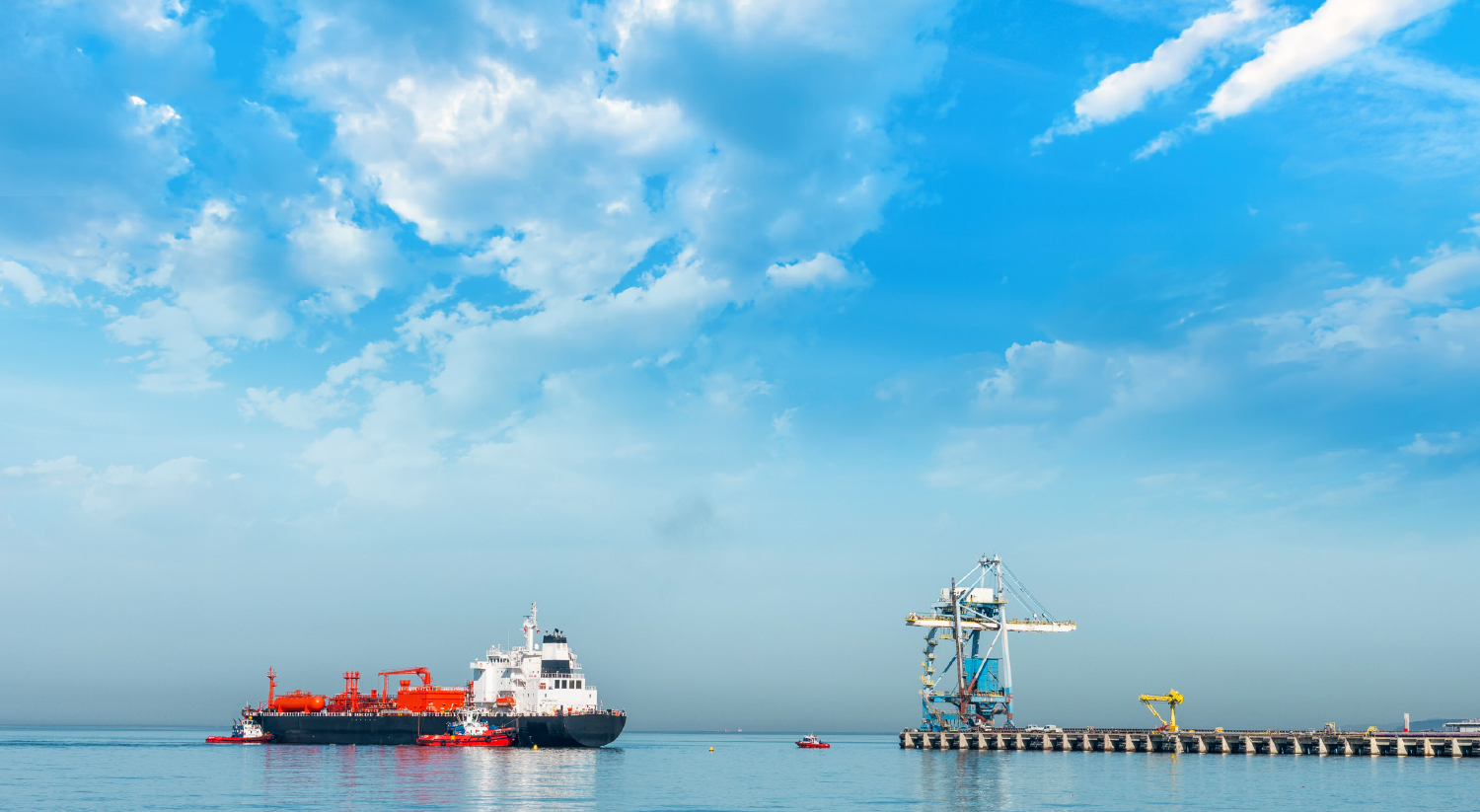
KR has announced a Memorandum of Understanding (MoU) with Hanwha Ocean, Amogy, and Hanwha Aerospace. The MoU, signed at Posidonia 2024 in Athens, Greece, focuses on the technical collaboration and certification for the application of ammonia reformers andammonia fuel cell systems to ships. The ammonia reformers, used to produce gaswith hydrogen as the main component and supply it to fuel cell stacks, areessential equipment for the adoption of fuel cell systems.
Amid the increasing global decarbonization regulations, ammonia is emerging as a highly efficient alternative fuel. This agreement aims to apply reformers and fuel cell systems to ships, enhancing energy efficiency and reducing carbon emissions, thereby lessening the environmental burden.
The MoU encompasses collaboration across various technological areas related to the application of reformers and fuelcell systems in ships. This includes design, development, testing, andcertification of ammonia reformers and fuel cell systems. Ultimately, thesafety and suitability of these systems will be verified based on KR’s rules, international conventions and standards, with KR planning to issue a New Technical Qualification (NTQ) certificate.
KIM Hyoungseog, Executive Vice President and CTO at Hanwha Ocean, stated, “This agreement will strengthen Hanwha Ocean's competitiveness in the eco-friendly ship market. We will continue to take a leading role in developing crucial new technologies for carbonneutrality in the shipping industry.”
Amogy's CEO, WOO Seonghoon, expressed hisdelight, stating, “This agreement brings us one step closer to the commercialization of eco-friendly ships using Amogy's ammonia-based fuel cell systems. I believe multi-party collaboration is vital for the decarbonization of the shipping industry, and we will continue to do our best to ensure the safe introduction of ammonia and ammonia-based fuel cell systems into the ship market.”
MOON Seunghak, Head of E-Propulsion SystemBusiness Group at Hanwha Aerospace, commented, “The introduction ofammonia-based fuel cell systems is essential for the decarbonization of theshipping industry. We expect to maximize synergy through the cooperation of thefour companies. This technological development will play a key role inestablishing a carbon-neutral ecosystem in the ship transportationmarket.”
YEON Kyujin, Senior Vice President of KR, added, “This agreement will be an important milestone in applying ammonia technology to ships. KR will continue to drive the decarboni-zation of the maritime industry, by providing technical support to ensure that reformers and fuel cell systems can be safely applied to ships.”
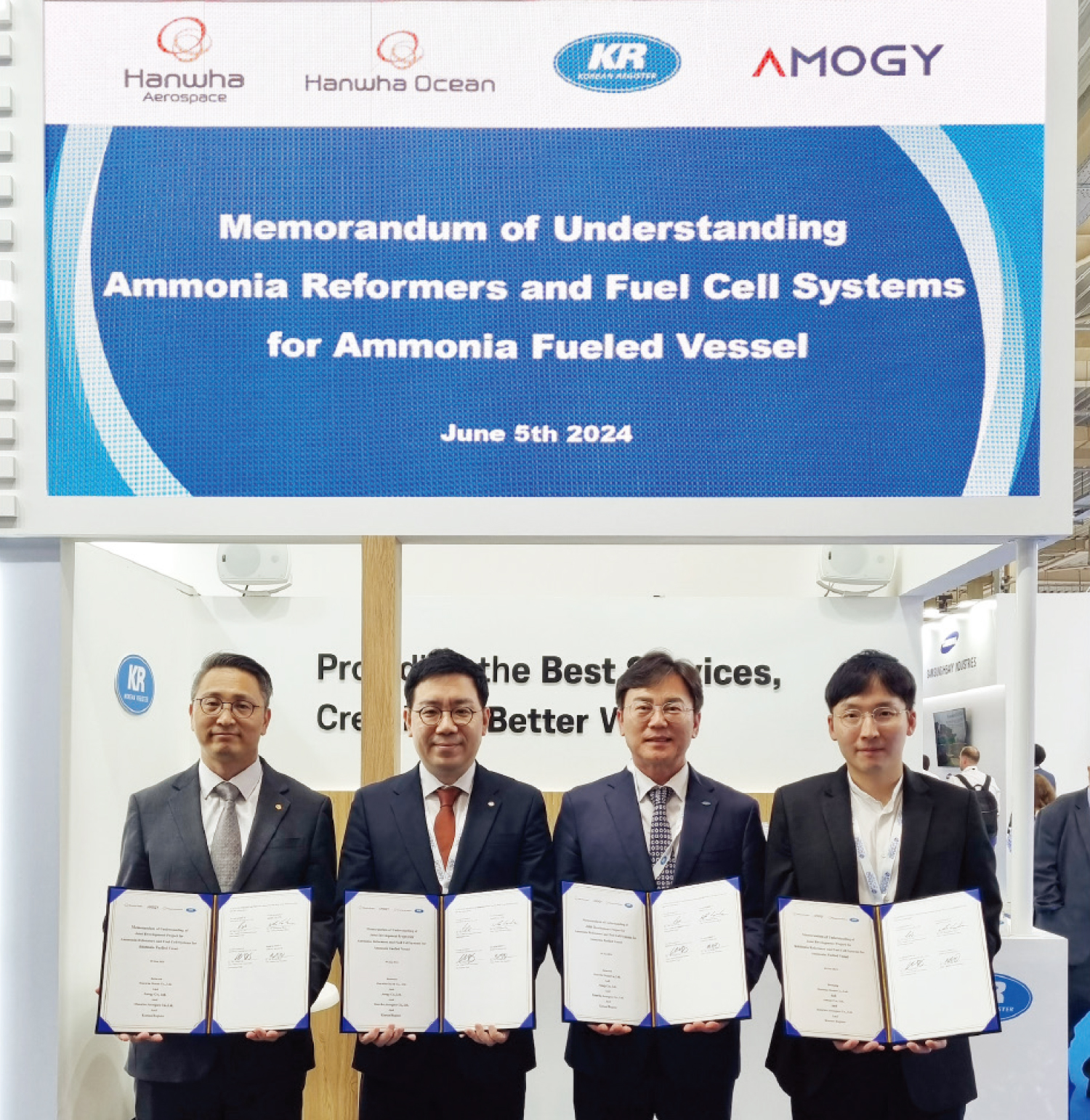
KR and Hanwha Ocean Sign Business
Agreement for Smart Navigation Solution
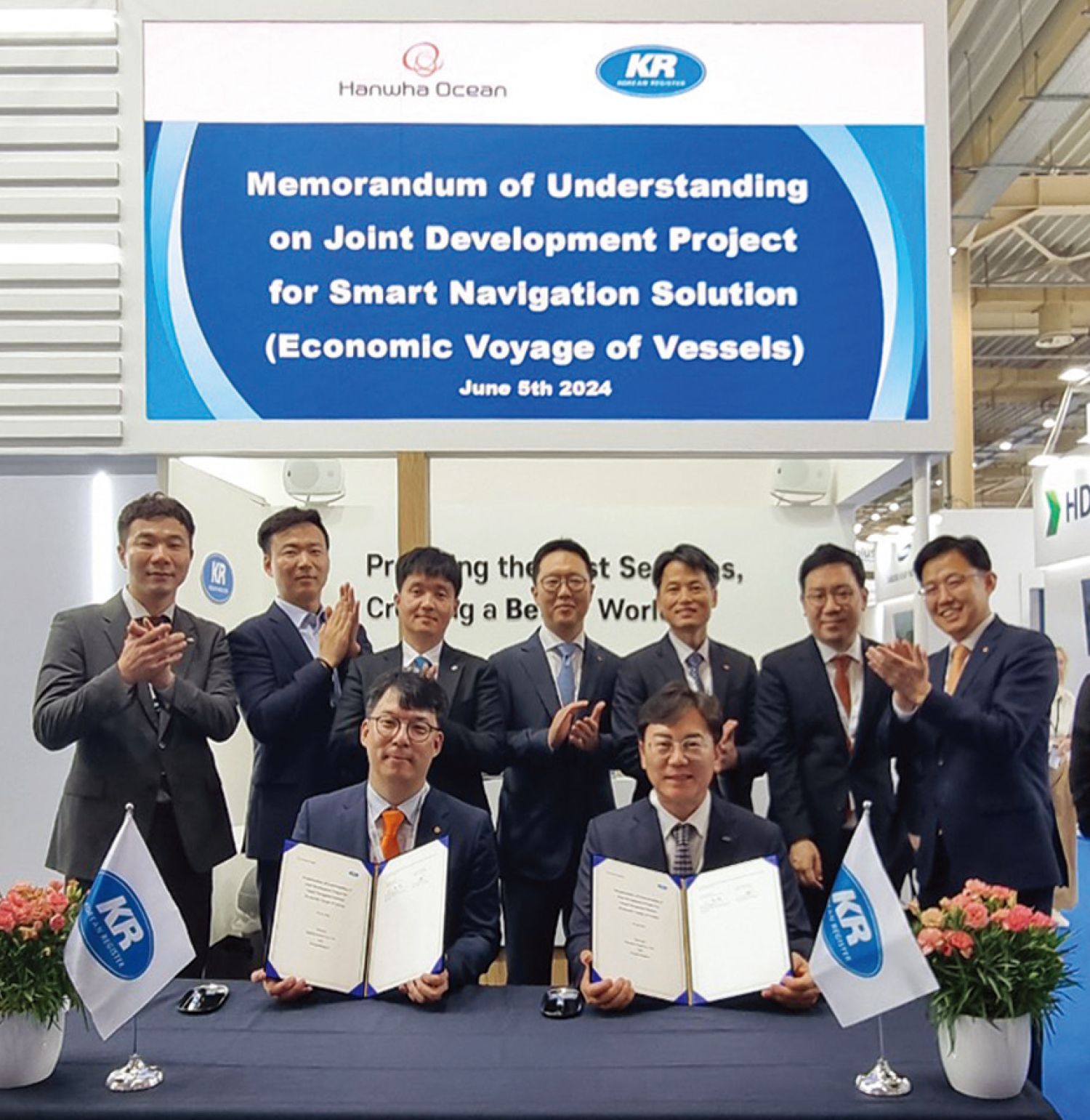
KR and Hanwha Ocean jointly signed a business agreement on June 5th for the purpose of developing the Smart Navigation Solution for economic voyage of vessels at Posidonia 2024 in Athens, Greece.
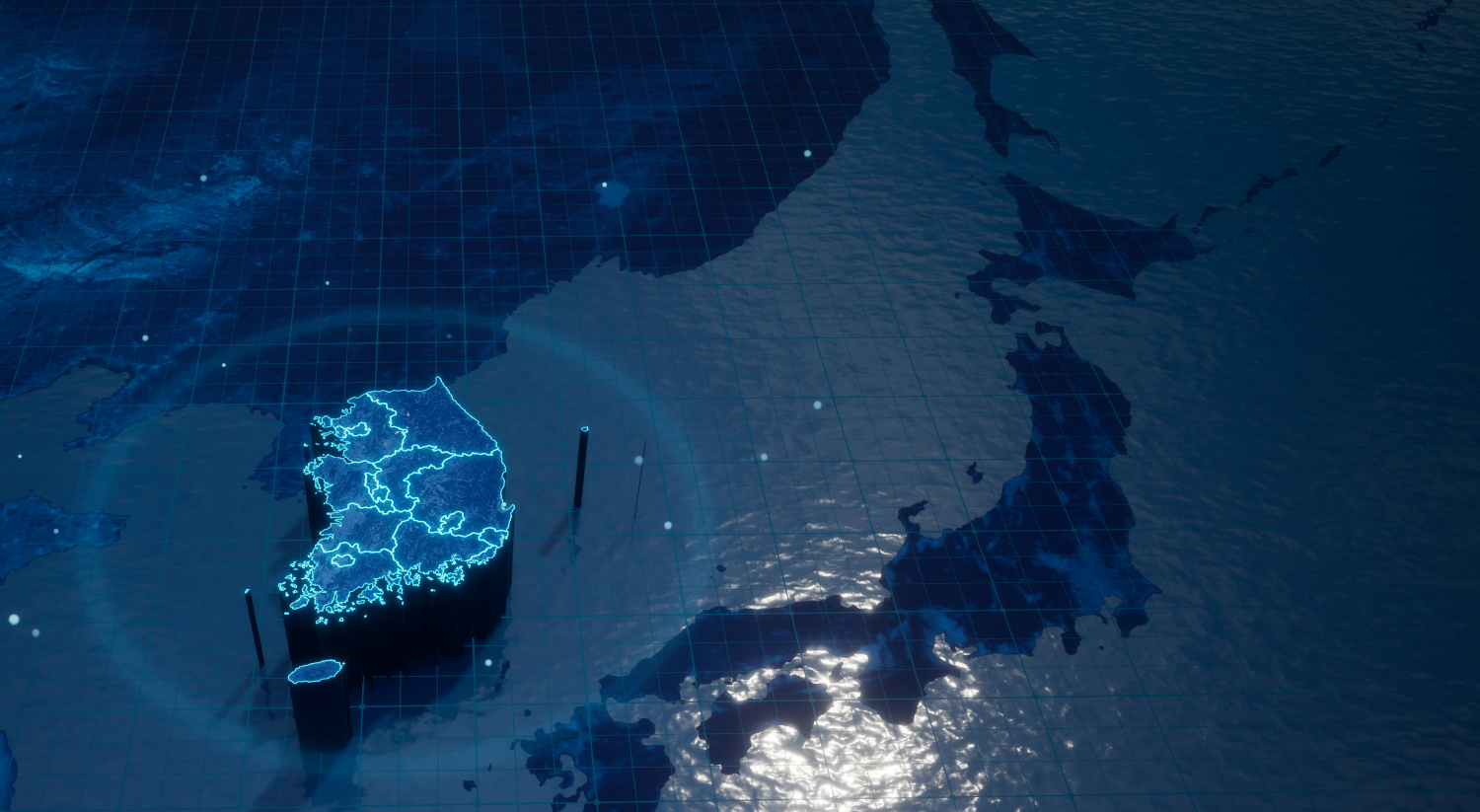
Amidst the global trend of increasing decarbonization regulations, Hanwha Ocean is leading digital innovation in the maritime industry by developing the Smart Navigation Solution—a fuel-saving solution based on optimal route analysis. This system collects real-time weather data, marine conditions, and vessel operational data, using AI-based analysis to propose the best routes. The goal is to reduce fuel consumption and contribute to environmental protection by lowering carbon emissions.
The agreement includes technical collabo-ration on fuel-saving effects based on data analysis and optimal routes using Hanwha Ocean’s Smart Navigation Solution. Ultimately, it aims to verify fuel-saving procedures and system installation and operation according to class rules and relevant standards, leading to KR's AIP (Approval in Principle).
LEE Joonghyuk, Team Leader of Hanwha Ocean, stated, “Through joint development project with KR, we will further advance economic operational technology and provide enhanced digital solutions with credible institutional certification. We anticipate increased competitiveness for Hanwha Ocean in project acquisition.”
YEON Kyujin, Senior Vice President of KR, commented, “This agreement serves as a good example of applying digital technology to address decarbonization regulations. We will continue to support Hanwha Ocean’s system implementation on vessels and validate the effectiveness of their solution.”
KR has granted AIP (Approval In Principal)
to
12K CBM Liquefied Carbon Dioxide Carrier
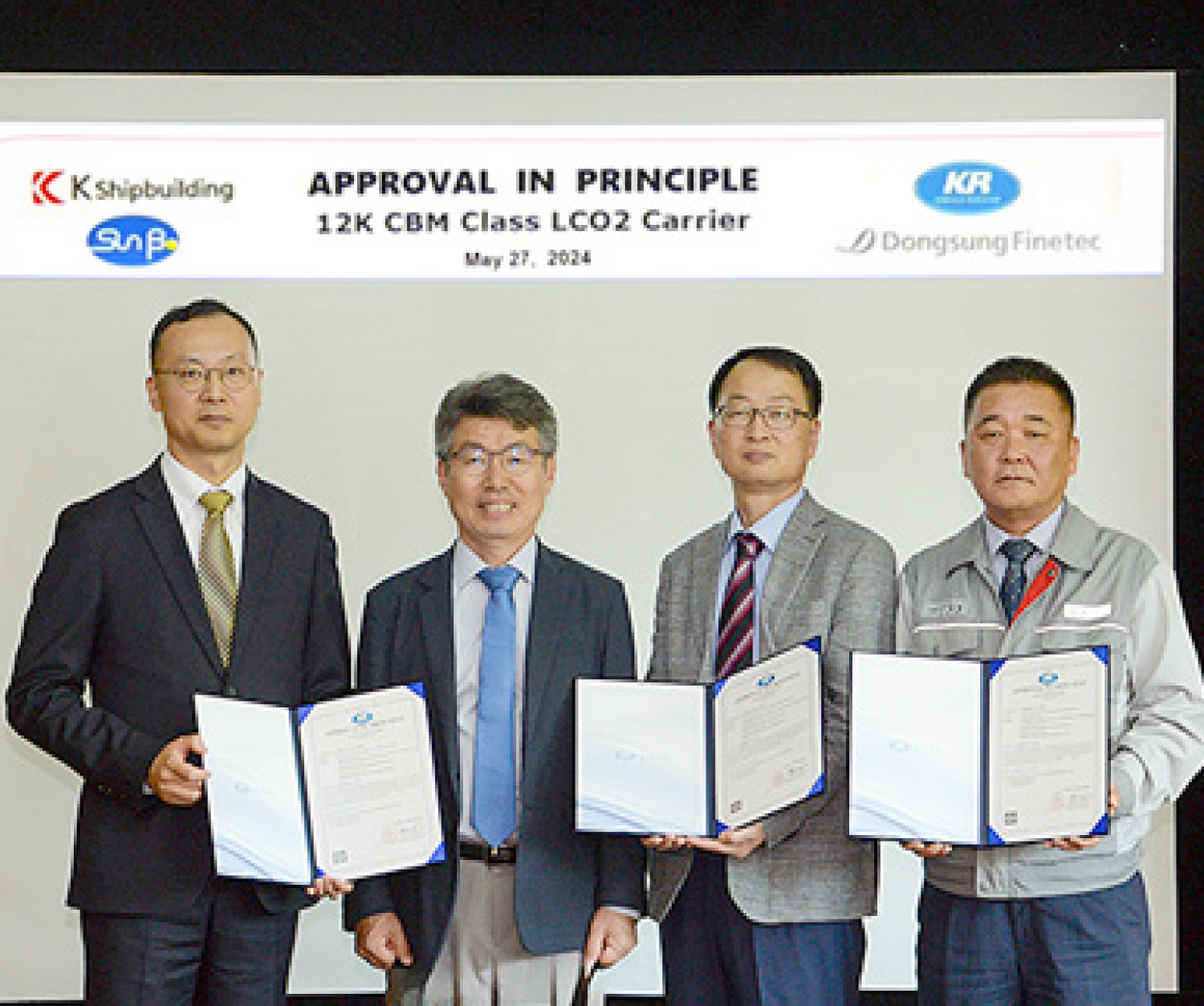
Amidst global decarbonization efforts, Carbon Capture and Storage (CCS) technology is increasingly popular, leading to rising demand for liquefied carbon dioxide carriers. KR has granted an AIP to a 12K CBM liquefied carbon dioxide carrier developed jointly by Dongsung Fintec, K-Shipbuilding, and Sunbo Industries on May 27th.
In this project, Dongsung Fintec developed LCO2 cargo tanks and LNG fuel tanks, K-Shipbuilding handled the basic and structural design of the carrier, and Sunbo Industries developed cargo handling and fuel supply systems. KR verified safety and suitability and ultimately awarded the AIP.
Developed through collaboration among KR, Dongsung Fintec, K-Shipbuilding, and Sunbo Industries, this 12K CBM class liquefied carbon dioxide carrier is expected to play a crucial role in achieving future carbon neutrality.
KR Releases Guide to Selection of
Thermal Properties for
Cryogenic Insulation Materials
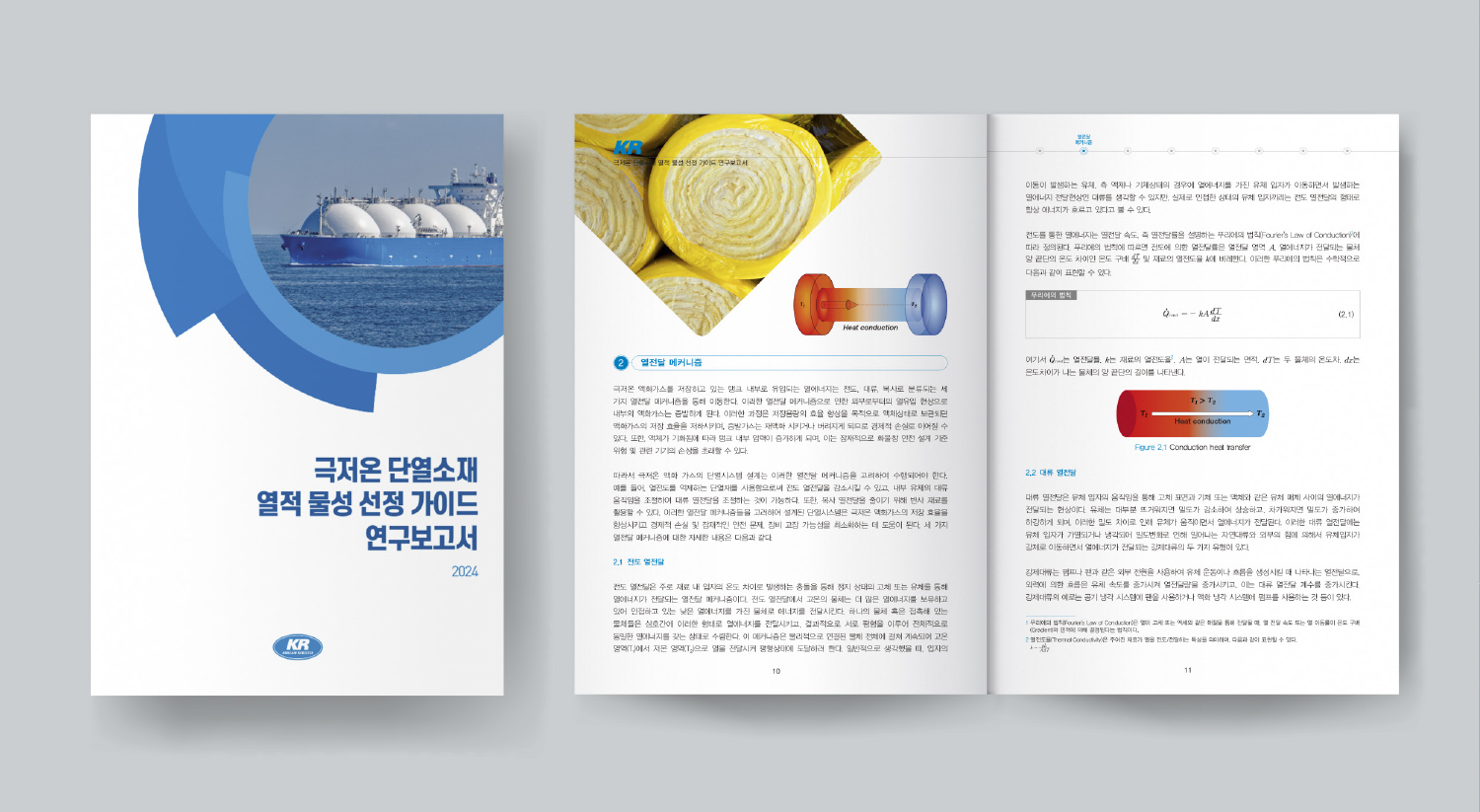
KR has published a research report titled “Guide to Selection of Thermal Properties for Cryogenic Insulation Materials” to ensure the safe storage of cryogenic cargoes (LNG or liquefied hydrogen) on ships.
Last year, the International Maritime Organization (IMO) adopted the 2023 IMO Strategy on Reduction of GHG Emissions from Ships with the goal of achieving international maritime carbon neutrality by 2050. The strategy aims to reduce greenhouse gas emissions by at least 20%, striving for 30%, by 2030, by at least 70%, striving for 80%, by 2040, compared to 2008 and achieving Net-Zero emissions by or around, i.e. close to 2050.
In response to these strengthened environmental regulations, the maritime industry is focusing not only on liquefied natural gas (LNG), which is currently widely used, but also on alternative fuels such as hydrogen and ammonia for long-term use. Particular attention is being paid to insulation system technologies for the safe and efficient transportation and storage of cryogenic fuels.
The representative cryogenic fuels are LNG and liquefied hydrogen. The liquefaction temperature of hydrogen is -253℃, which is approximately 90℃ lower than LNG, requiring advanced insulation technologies. As liquefied hydrogen reduces its volume by about 800 times compared to its gaseous state.
In this regard, KR, in collaboration with the Korea Institute of Machinery and Materials (Kim Yongjin and Lee Taehyun), Pusan National University (Professor Kim Jeong-Hyeon), and Seoul National University of Science and Technology (Professor Park Changkyoo), has published the “Guide to Selection of Thermal Properties for Cryogenic Insulation Materials” to propose essential insu-lation system technologies for the cryogenic fuels.

The research report explains the insulation systems for LNG at -163℃ and for liquefied hydrogen at -253℃ applied to ships, as well as analyzes environmental factors affecting their designs such as heat transfer mechanisms. Based on this, it is expected to serve as a technical guide in the material selection stage when designing insulation systems for cryogenic environments or developing innovative insulation systems.
KR will continuously provide customers with various technical services through the proactive development of alternative fuel technologies.
| MacNet Strategy Seminar |
Strategy for Establishing a Green Shipping Corridor
to Achieve Net-Zero
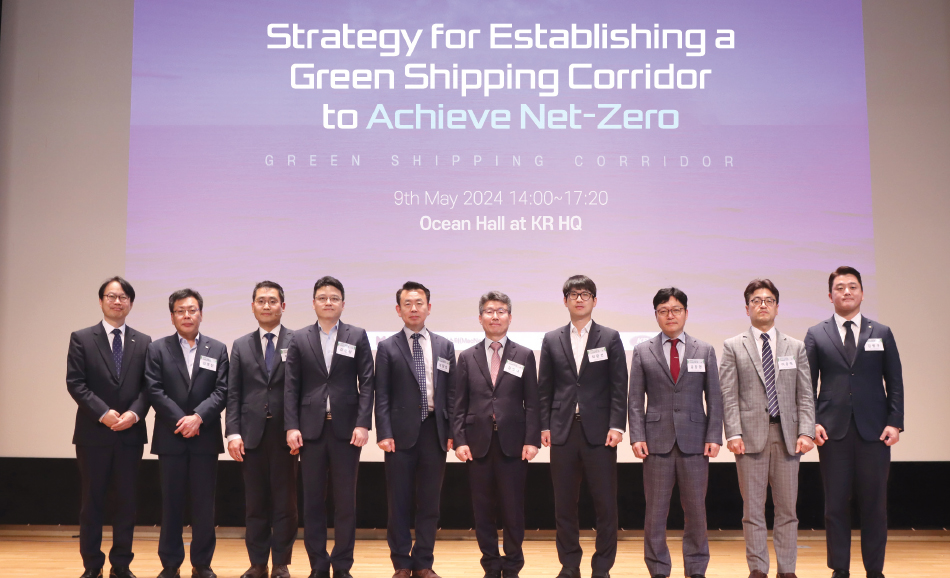
On May 9th, the Maritime Cluster Networking in Korea (MacNet) held the “MacNet Strategy Seminar 2024 – I, Strategy for Establishing a Green Shipping Corridor to Achieve Net-Zero”.
The seminar, hosted by MacNet and supported by Busan Metropolitan City and KR, focused on the strategy for establishing a Green Shipping Corridor to achieve Net-Zero by 2050 in international shipping. The government and related industries gathered to delve into the conditions and preparations for the introduction of the Green Shipping Corridor, especially in ports such as Busan and Ulsan.
The seminar comprised three sessions. In the first session, presentations were given on the global Green Shipping Corridor initiative by LEE Chigyung from the Ministry of Oceans and Fisheries, and on the strategies for building a Green Shipping Corridor by KIM Youngsun from HMM.
The second session featured presentations on the challenges of eco-friendly fuel bunkering as part of the role of Busan Port as a container hub by Lee Eunhyuk from Busan Port Authority, and on the establishment of an eco-friendly ship fuel supply network in cooperation with Busan Port by Kim Byeonggu, Ulsan Port Authority.
The final session comprised a comprehensive discussion on the topics presented in the previous two sessions. SONG Kanghyun, Head & Senior Vice President of KR’s Decarbonization Ship R&D Center, chaired the discussion, with participation from officials from the Ministry of Oceans and Fisheries, the Busan Metropolitan City Port Authority, and the four presenters from the earlier sessions.
▼Find out more

